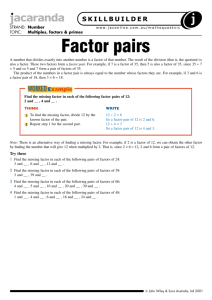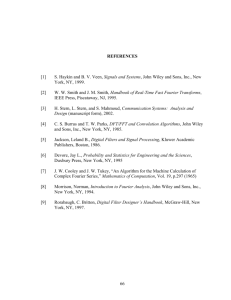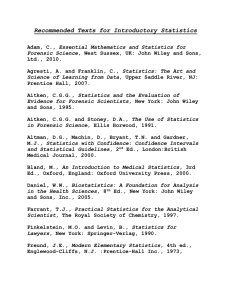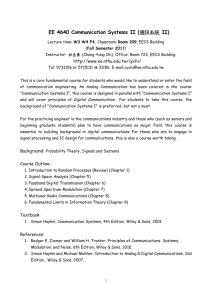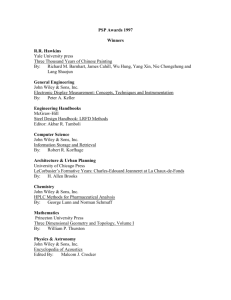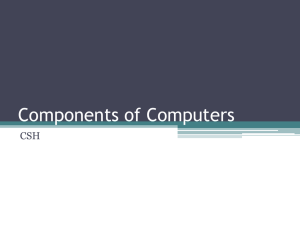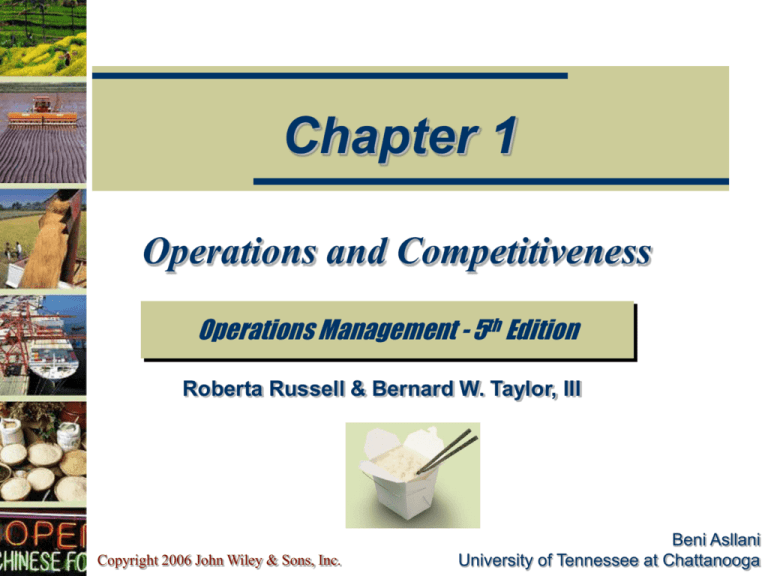
Chapter 1
Operations and Competitiveness
Operations Management - 5th Edition
Roberta Russell & Bernard W. Taylor, III
Copyright 2006 John Wiley & Sons, Inc.
Beni Asllani
University of Tennessee at Chattanooga
Lecture Outline
What Do Operations Managers Do?
Operations Function
Evolution of Operations Management
Operations Management and E–Business
Globalization and Competitiveness
Primary Topics in Operations Management
Learning Objectives for this Course
Copyright 2006 John Wiley & Sons, Inc.
1-2
What Do Operations
Managers Do?
What is Operations?
a function or system that transforms inputs into outputs of
greater value
What is a Transformation Process?
a series of activities along a value chain extending from
supplier to customer
activities that do not add value are superfluous and
should be eliminated
What is Operations Management?
design, operation, and improvement of productive
systems
Copyright 2006 John Wiley & Sons, Inc.
1-3
Transformation Process
Physical: as in manufacturing operations
Locational: as in transportation operations
Exchange: as in retail operations
Physiological: as in health care
Psychological: as in entertainment
Informational: as in communication
Copyright 2006 John Wiley & Sons, Inc.
1-4
Operations as a
Transformation Process
INPUT
•Material
•Machines
•Labor
•Management
•Capital
TRANSFORMATION
PROCESS
OUTPUT
•Goods
•Services
Feedback
Copyright 2006 John Wiley & Sons, Inc.
1-5
Operations Function
Operations
Marketing
Finance and
Accounting
Human
Resources
Outside
Suppliers
Copyright 2006 John Wiley & Sons, Inc.
1-6
How is Operations Relevant to my
Major?
Accounting
Information
Technology
Management
“As an auditor you must
understand the fundamentals of
operations management.”
“IT is a tool, and there’s no better
place to apply it than in
operations.”
“We use so many things you
learn in an operations class—
scheduling, lean production,
theory of constraints, and tons of
quality tools.”
Copyright 2006 John Wiley & Sons, Inc.
1-7
How is Operations Relevant to my
Major?
Economics
Marketing
Finance
“It’s all about processes. I live
by flowcharts and Pareto
analysis.”
“How can you do a good job
marketing a product if you’re
unsure of its quality or delivery
status?”
“Most of our capital budgeting
requests are from operations,
and most of our cost savings,
too.”
Copyright 2006 John Wiley & Sons, Inc.
1-8
Evolution of Operations
Management
Craft production
process of handcrafting products or
services for individual customers
Division of labor
dividing a job into a series of small tasks
each performed by a different worker
Interchangeable parts
standardization of parts initially as
replacement parts; enabled mass
production
Copyright 2006 John Wiley & Sons, Inc.
1-9
Evolution of Operations
Management (cont.)
Scientific management
systematic analysis of work methods
Mass production
high-volume production of a standardized
product for a mass market
Lean production
adaptation of mass production that prizes
quality and flexibility
Copyright 2006 John Wiley & Sons, Inc.
1-10
Historical Events in
Operations Management
Era
Industrial
Revolution
Events/Concepts
Dates
Originator
Steam engine
Division of labor
Interchangeable parts
Principles of scientific
management
1769
1776
1790
James Watt
1911
Frederick W. Taylor
Time and motion studies
Scientific
Management Activity scheduling chart
Moving assembly line
Copyright 2006 John Wiley & Sons, Inc.
1911
1912
1913
Adam Smith
Eli Whitney
Frank and Lillian
Gilbreth
Henry Gantt
Henry Ford
1-11
Historical Events in
Operations Management (cont.)
Era
Human
Relations
Operations
Research
Events/Concepts
Dates
Originator
Hawthorne studies
1930
1940s
1950s
1960s
1947
1951
Elton Mayo
Abraham Maslow
Frederick Herzberg
Douglas McGregor
George Dantzig
Remington Rand
1950s
Operations research
groups
1960s,
1970s
Joseph Orlicky, IBM
and others
Motivation theories
Linear programming
Digital computer
Simulation, waiting
line theory, decision
theory, PERT/CPM
MRP, EDI, EFT, CIM
Copyright 2006 John Wiley & Sons, Inc.
1-12
Historical Events in
Operations Management (cont.)
Era
Events/Concepts Dates Originator
JIT (just-in-time)
TQM (total quality
management)
Quality
Strategy and
Revolution
operations
Business process
reengineering
Copyright 2006 John Wiley & Sons, Inc.
1970s
1980s
1990s
1990s
Taiichi Ohno (Toyota)
W. Edwards Deming,
Joseph Juran
Wickham Skinner,
Robert Hayes
Michael Hammer,
James Champy
1-13
Historical Events in
Operations Management (cont.)
Era
Events/Concepts
Dates Originator
Globalization
WTO, European Union,
and other trade
agreements
Internet, WWW, ERP,
supply chain
management
1990s
2000s
Numerous countries
and companies
1990s
E-commerce
2000s
ARPANET, Tim
Berners-Lee SAP,
i2 Technologies,
ORACLE,
PeopleSoft
Amazon, Yahoo,
eBay, and others
Internet
Revolution
Copyright 2006 John Wiley & Sons, Inc.
1-14
Continuum from Goods
to Services
Source: Adapted from Earl W. Sasser, R. P. Olsen, and D. Daryl Wyckoff,
Management of Service Operations (Boston: Allyn Bacon, 1978), p.11.
Copyright 2006 John Wiley & Sons, Inc.
1-15
Business
Consumer
Business
B2B
Commerceone.com
B2C
Amazon.com
Consumer
Operations Management
and E-Business
C2B
Priceline.com
C2C
eBay.com
Categories of E-Commerce
Copyright 2006 John Wiley & Sons, Inc.
1-16
An Integrated Value Chain
Value chain: set of activities that create and
deliver products to customer
Customer
Manufacturer
Supplier
Flow of information (customer order)
Flow of product (order fulfillment)
Copyright 2006 John Wiley & Sons, Inc.
1-17
Impact of E-Business on
Operations Management
Benefits of E-Business
Comparison shopping
by customers
Direct contact with
customers
Business processes
conducted online
Copyright 2006 John Wiley & Sons, Inc.
Impact on Operations
Customer expectations escalate;
quality must be maintained and
costs lowered
No more guessing about demand
is necessary; inventory costs go
down; product and service design
improves; build to-order products
and services is made possible
Transaction costs are lower;
customer support costs decrease;
e-procurement saves big bucks
1-18
Impact of E-Business on
Operations Management (cont.)
Benefits of E-Business
Impact on Operations
Access to customers Demand increases; order fulfillment
and logistics become major issues;
worldwide
production moves overseas
Middlemen are
eliminated
Access to suppliers
worldwide
Copyright 2006 John Wiley & Sons, Inc.
Logistics change from delivering to a
store or distribution center to
delivering to individual homes;
consumer demand is more erratic and
unpredictable than business demand
Outsourcing increases; more alliances
and partnerships among firms are
formed; supply is less certain; global
supply chain issues arise
1-19
Impact of E-Business on
Operations Management (cont.)
Benefits of E-Business
Impact on Operations
Online auctions and emarketplaces
Better and faster
decision making
Competitive bidding lowers cost
of materials; supply needs can be
found in one location
More timely information is
available with immediate access
by all stakeholders in decisionmaking process; customer orders
and product designs can be
clarified electronically; electronic
meetings can be held;
collaborative planning is
facilitated
Copyright 2006 John Wiley & Sons, Inc.
1-20
Impact of E-Business on
Operations Management (cont.)
Benefits of E-Business
IT synergy
Expanded supply
chains
Copyright 2006 John Wiley & Sons, Inc.
Impact on Operations
Productivity increases as
information can be shared more
efficiently internally and
between trading partners
Order fulfillment, logistics,
warehousing, transportation and
delivery become focus of
operations management; risk is
spread out; trade barriers fall
1-21
Globalization and
Competitiveness
Favorable cost
Access to international
markets
Response to changes in
demand
Reliable sources of
supply
14 major trade
agreements in 1990s
Peak: 26% in 2000
Copyright 2006 John Wiley & Sons, Inc.
World Trade Compared to World GDP
Source: “Real GDP and Trade Growth of OECD Countries, 2001–03,”
International Trade Statistics 2003, World Trade Organization,
www.wto.org
1-22
Globalization and
Competitiveness (cont.)
Germany: $26.18
USA: $21.33
Taiwan: $5.41
Mexico: $2.38
Hourly Wage Rates for Selected Countries
Source: “International Comparisons of Hourly Compensation Costs for Production Workers in
Manufacturing,” Bureau of Labor Statistics, U.S. Department of Labor, Updated September 30, 2003.
Copyright 2006 John Wiley & Sons, Inc.
China: $0.50
1-23
Globalization and
Competitiveness (cont.)
Trade with China: Percent of each country‘s trade
Source: “Share of China in Exports and Imports of Major Traders, 2000 and 2002,”
International Trade Statistics 2003, World Trade Organization, www.wto.org
Copyright 2006 John Wiley & Sons, Inc.
1-24
Risks of Globalization
Cultural differences
Supply chain logistics
Safety, security, and
stability
Quality problems
Corporate image
Loss of capabilities
Copyright 2006 John Wiley & Sons, Inc.
1-25
Competitiveness and
Productivity
Competitiveness
degree to which a nation can produce goods and
services that meet the test of international
markets
Productivity
ratio of output to input
Output
sales made, products produced, customers
served, meals delivered, or calls answered
Input
labor hours, investment in equipment, material
usage, or square footage
Copyright 2006 John Wiley & Sons, Inc.
1-26
Competitiveness and
Productivity (cont.)
Measures of Productivity
Copyright 2006 John Wiley & Sons, Inc.
1-27
Changes in Productivity
for Select Countries
Internet-enabled
productivity
- Dot com bust
- 9/11 terrorist attacks
Source: “International Comparisons of Manufacturing Productivity and Unit Labor Cost Trends, 2002,” Bureau of Labor
Statistics, U.S. Department of Labor, September 2003. U.S. figures for 2002–2003 from “Major Sector Productivity and
Costs Index,” Bureau of Labor Statistics, U.S. Department of Labor, March 2004
Copyright 2006 John Wiley & Sons, Inc.
1-28
Productivity Increase
Become efficient
output increases with little or no increase in input
Expand
both output and input grow with output growing
more rapidly
Achieve breakthroughs
output increases while input decreases
Downsize
output remains the same and input is reduced
Retrench
both output and input decrease, with input
decreasing at a faster rate
Copyright 2006 John Wiley & Sons, Inc.
1-29
Competitiveness and
Productivity
Breakthrough
Performance
More Efficient
Retrench
Productivity as a Function of Inputs and Outputs, 2001–2002
Source: “International Comparisons of Manufacturing Productivity and Unit Labor Cost Trends, 2002,” Bureau of Labor
Statistics, U.S. Department of Labor, September 2003
Copyright 2006 John Wiley & Sons, Inc.
1-30
Global Competitiveness
Ranking
1. Finland
2. United States
3. Sweden
4. Denmark
5. Taiwan
6. Singapore
7. Switzerland
8. Iceland
9. Norway
10. Australia
Copyright 2006 John Wiley & Sons, Inc.
Source: Global Competitiveness Report
2003–2004, World Economic Forum,
January 2004, www.weforum.org
1-31
Operations–Oriented
Barriers to Entry
Economies of Scale
Capital Investment
Access to Supply and Distribution
Channels
Learning Curve
Copyright 2006 John Wiley & Sons, Inc.
1-32
Primary Topics in
Operations Management
Copyright 2006 John Wiley & Sons, Inc.
1-33
Primary Topics in Operations
Management (cont.)
Copyright 2006 John Wiley & Sons, Inc.
1-34
Operations Strategy
Strategy: Chapter 2
Maintaining an operations strategy to support firm’s
competitive advantage
Quality: Chapters 3 and 4
Focusing on quality in operational decision making
Product and Services: Chapter 5
Designing quality products and services
Processes, Technologies, and Capacity: Chapter 6
Setting up process so that it works smoothly and
efficiently
Copyright 2006 John Wiley & Sons, Inc.
1-35
Operations Strategy
(cont.)
Facilities: Chapter 7
Setting up facility so that it works
smoothly and efficiently
Human Resources: Chapter 8
Designing jobs and work to produce
quality products
Project Management: Chapter 9
Managing complex projects
Copyright 2006 John Wiley & Sons, Inc.
1-36
Supply Chain
Management
Supply Chain: Chapter 10
Managing supply chain
Forecasting: Chapter 11
Predicting customer demand
Aggregate Planning: Chapter 12
How much to produce and when to
produce it
Inventory Management: Chapter 13
How much to order and when to order
Copyright 2006 John Wiley & Sons, Inc.
1-37
Supply Chain
Management (cont.)
Resource Planning: Chapter 14
Planning capacity and other resources
Lean Production: Chapter 15
Designing efficient production lines
Scheduling: Chapter 16
Job and task assignments
Waiting Lines: Chapter 17
Minimizing waiting time of customers and
products
Copyright 2006 John Wiley & Sons, Inc.
1-38
Learning Objectives of
this Course
Gain an appreciation of strategic importance
of operations in a global business
environment
Understand how operations relates to other
business functions
Develop a working knowledge of concepts
and methods related to designing and
managing operations
Develop a skill set for quality and process
improvement
Copyright 2006 John Wiley & Sons, Inc.
1-39
Copyright 2006 John Wiley & Sons, Inc.
All rights reserved. Reproduction or translation of this work beyond that
permitted in section 117 of the 1976 United States Copyright Act without
express permission of the copyright owner is unlawful. Request for further
information should be addressed to the Permission Department, John Wiley &
Sons, Inc. The purchaser may make back-up copies for his/her own use only and
not for distribution or resale. The Publisher assumes no responsibility for
errors, omissions, or damages caused by the use of these programs or from the
use of the information herein.
Copyright 2006 John Wiley & Sons, Inc.
1-40

